CNG News
| Date | Description |
|---|---|
| September 24, 2025 | The Wu Lab’s new Immunity publication has been featured in the UTHealth Houston McGovern Medical School Newsletter. Dr. Wu noted that the discovery of rod-shaped microglia may play a protective role in neurodegeneration, laying foundation for new therapeutic targets in ALS and other neurodegenerative diseases. 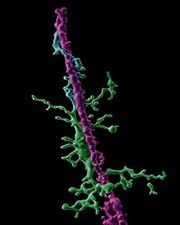 |
| September 19, 2025 | Manling Xie, former PhD trainee from Wu lab, has published in Immunity titled “Rod-shaped microglia interact with neuronal dendrites to regulate cortical excitability in TDP-43 related neurodegeneration.”This paper, based on research done during her PhD training in the Wu lab, showed rod-shaped microglia play a neuroprotective role by attenuating cortical hyperexcitability in TDP-43-related neurodegeneration. Many congratulations to the Wu lab on their publication! 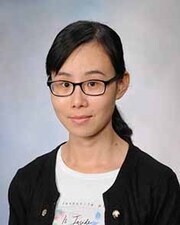 |
| September 10, 2025 | The Wu Lab published “Harnessing the Power of Brain Immunity in Health and Diseases” in the UTHealth Houston Neuroscience Research Center Newsletter. Highlighting research done at the CNG, the newsletter explores microglia–neuron communication, synaptic regulation, and neuroimmune mechanisms in neurodegeneration, with the goal of advancing therapeutic strategies for treating brain disorders.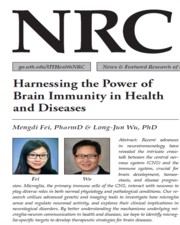 |
| September 4, 2025 | The CNG was represented at the recent IMM Research Retreat, where Dr. Long-Jun Wu presented an overview of the center’s new faculty and projects. As a highlight, an image of rod-shaped microglia from the Wu Lab’s Immunity publication was featured on the retreat cover. This event provided a valuable platform for sharing research updates and ideas. 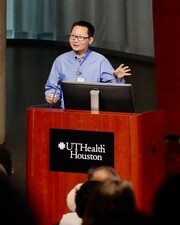 |
| September 2, 2025 | The CNG is pleased to announce the promotion of Dr. Yuanzhong Xu to tenure-track Assistant Professor, effective September 2, 2025. Dr. Xu’s research leverages advanced genetic, imaging, and behavioral techniques to uncover neural mechanisms regulating feeding, emotional responses, and reward approach. Congratulations to Dr. Xu on this achievement and look forward to his continued contributions. 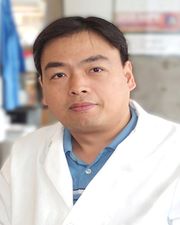 |
| August 26, 2025 | We are excited to announce the launch of the CNG Seminar Series this October. The CNG monthly seminars will be held on the third Thursday of each month from 4:00–5:00 p.m. in the Margolis Lounge. To promote interactions and strengthen collaborations across CNG laboratories, each seminar will feature presentations from CNG resident labs highlighting published research, works-in-progress, or invited guest speakers. All CNG-affiliated faculty and lab members are warmly invited to attend these sessions. The CNG seminars are scheduled on the following dates in fiscal year 2025–2026: October 16, 2025, November 20, 2025, January 15, 2026, February 19, 2026, April 16, 2026, May 21, 2026, July 16, 2026. August 20, 2026. Please mark your calendars and join us for these monthly opportunities to exchange ideas, showcase discoveries, and strengthen our collaborative community. |
| August 25, 2025 | The CNG is pleased to welcome Dr. Simone Brioschi, who joins the faculty as a tenure-track Assistant Professor. Dr. Brioschi brings a strong background in neuroimmunology, with research interests focusing on the brain macrophages and their roles in both brain health and disease. At the CNG, Dr. Brioschi will further his research into neuroimmune interactions, contributing to the center’s mission of advancing brain science and accelerating the development of neuroimmune therapies for neurological disorders.  |
| August 24, 2025 | Mekenzie Peshoff, PhD student from Wu Lab, has been awarded a competitive NIH F31 fellowship to support her research on the role of the immune receptor TREM2 in glioma progression. Her project, titled “Understanding the role of triggering receptor on myeloid cells 2 (TREM2) on microglia and macrophages across glioma progression,” investigates how TREM2 expression in different immune cell types and disease stages contributes to glioma maintenance. The research aims to identify genetic subtypes of brain cancer that may respond to TREM2 modulation and highlight immune populations that could serve as promising therapeutic targets — a significant step toward more precise and effective glioma treatments. Mekenzie’s insight and advice on F31 application process were highlighted in the Graduate School of Biomedical Sciences News at the MD Anderson Cancer Center and UTHealth Houston. With this fellowship, she gains valuable experience in grant writing and independent funding — a key milestone that will enhance her competitiveness for future research opportunities and academic positions. 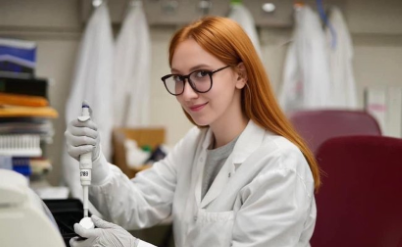 |
| August 21, 2025 | Jordy Sepulveda, CNG trainee from Wu lab, has been awarded a prestigious NIH K00 award from the National Institute on Aging. This Post-Doctoral Transition Award supports exceptional graduate students who have shown strong potential and commitment to becoming independent researchers, helping them successfully bridge the transition from graduate students to postdoctoral research positions. This 4-year award will support Jordy’s research on microglial Ca2+ signaling in neurodegeneration at Wu lab. Many congrats to Jordy for this impressive achievement! 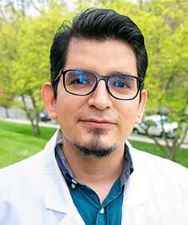 |
| July 22, 2025 | Dr. Hongli Li, postdoctoral fellow from Tong lab at the CNG, has published a first-author paper in Cell Reports titled “An alternative neural basis underlying leptin resistance.” The study reveals activation of Arc non-LepR neurons, even with intact leptin-pSTAT3 signaling, is sufficient to cause obesity and leptin resistance. Many congratulations to the Tong lab on their publication!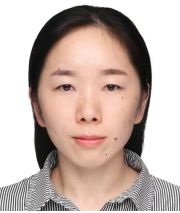 |
| June 2, 2025 | The CNG is pleased to announce that Dr. Dongjoo Choi has officially joined the faculty as an Assistant Professor. Dr. Choi brings strong expertise in glial biology and neurodegeneration, with a particular focus on the roles of astrocytes in brain disorders such as Alzheimer’s disease, Parkinson’s disease, and glioblastoma. Dr. Choi joins the CNG from Baylor College of Medicine, where he served as an Instructor at the Center for Cell and Gene Therapy and the Center for Cancer Neuroscience. Dr. Choi’s research integrates genetic mouse models, transcriptomic profiling, and glial–immune interaction analyses to investigate how disease-associated astrocytes and their crosstalk with microglia contribute to neurodegenerative disease progression and neural repair. His work also explores the shared glial regulatory mechanisms across brain pathologies, such as glioblastoma. Dr. Choi’s research at Baylor led to the identification of novel function of reactive astrocytes in Alzheimer’s disease, the discovery of region-specific astrocyte development, and novel tumor suppressors in glioblastoma. His findings have been published in high-impact journals such as Nature, Science, and Science Advances. At CNG, Dr. Choi’s lab will continue to pursue investigations in astrocyte-specific transcriptional programs and their roles in disease onset, progression, and recovery—advancing the center’s mission of developing innovative neuroimmune therapies for brain disorders. 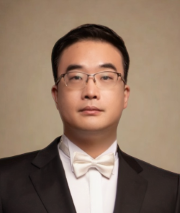 |
| May 29, 2025 | Abhijeet S. Barath, a CNG trainee from the Wu Lab in the Neuroscience track at the Mayo Clinic Graduate School of Biomedical Sciences, successfully defended his PhD thesis, entitled “Swell1 Loss in Microglia Drives Male-Specific Seizure Vulnerability but Broad Neuroprotection through Impaired Lysosomal Biogenesis,” at UTHealth-Houston on May 29, 2025. The CNG extends its warmest congratulations to Dr. Barath on this significant achievement and wishes him continued success in his future career. 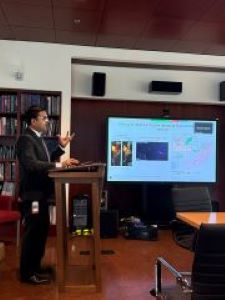 |
| May 27, 2025 | Min-Hee Yi, former postdoctoral trainee from Wu lab, has published a first-author paper in Cell Reports titled “Optogenetic activation of cortical microglia promotes neuronal activity and pain hypersensitivity.” This study, based on research conducted during her time in the Wu Lab, demonstrates that optogenetic activation of cortical microglia induces pain hypersensitivity through enhanced neuronal activity and ATP signaling.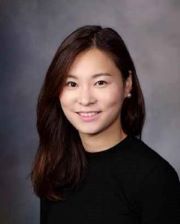 |
| May 23, 2025 | The CNG is delighted to welcome Dr. Xinzhu Yu, joining the faculty as an Associate Professor. Dr. Yu brings extensive expertise in astrocyte physiology, with a focus on how these glial cells contribute to brain function and play a role in neurological and psychiatric disorders. She joins the CNG from the University of Illinois at Urbana-Champaign, where she worked as an Assistant Professor in the Department of Molecular and Integrative Physiology. Dr. Yu uses genetic/chemogenetic tools, in vivo imaging, behavioral assays, cell type-specific transcriptomics/proteomics and computational modeling to explore the functional versatility of astrocytic regulation in neural circuits and its influence on complex behaviors and disease mechanisms. Her innovative work has been recognized with several prestigious awards, including the Director’s New Innovator Award from NIH, the NARSAD Young Investigator Award, P&S Fund Investigator, from the Brain and Behavior Research Foundation, and the Whitehall Research Grant Award from the Whitehall Foundation. At the CNG, Dr. Yu will continue to advance her multidisciplinary research, fostering new collaborations and contributing to the center’s mission of driving innovation in brain science and developing neuroimmune therapy for brain disorders. 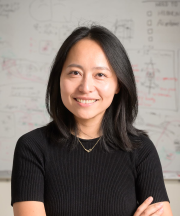 |
| May 15, 2025 | Praveen Pallegar, CNG trainee from Wu lab, has received F31 Research Fellowship Award from the National Institute of Neurological Disorders and Stroke of the NIH. This award supports promising predoctoral researchers in the scientific-related field by providing mentored training during their dissertation research, with the goal of fostering their development into independent and productive scientists. Many congratulations to Praveen on this well-deserved achievement! 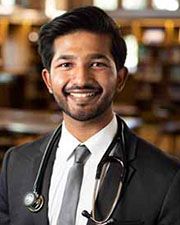 |
| May 2, 2025 | CNG staff Koichi Haruwaka, from the Wu Lab, received the Early Career Epilepsy Award from the Epilepsy Exchange held at the Texas Medical Center in Houston. At the conference, Koichi presented his research on microglial interaction with neurovasculature in the maintenance of the blood-brain barrier during acute seizures in a poster session. Congratulations to Koichi on this well-deserved recognition of his work. 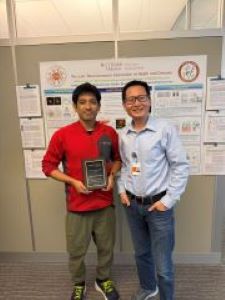 |
| April 25, 2025 | CNG director Dr. Long-Jun Wu hosted the 2nd Annual Hans J. Müller-Eberhard Symposium on Neuroimmunology and Glial Biology at UT Health Houston. The symposium featured thirteen leading experts in the field, who presented the latest research advancement in neuroimmunology and glial biology. Attendees had opportunities to engage with leading scientists and fellow researchers through in-person discussions and networking.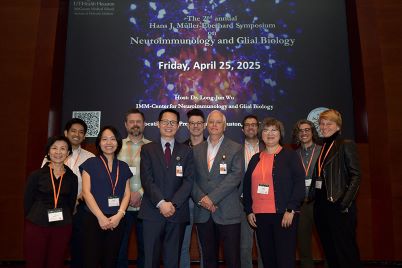 |
| April 23, 2025 | CNG is excited to announce the official launch of Neuroscience Behavioral Core. We are dedicated to advancing research in the field of neuroscience and neuroimmunology by providing cutting-edge tools and service for studying mouse behaviors. The Core is equipped with state-of-the-art technology, including automated Behavioral Tracking Systems, Behavioral Testing Equipment, and Recording Systems etc. We encourage interdisciplinary collaborations and offer training programs on mouse behavioral testing and the use of our equipment in the Core. For more questions, please email the Core manager, Neo Shi ([email protected]). For booking the equipment and space at the Neuroscience Behavioral Core, please visit the Core website. 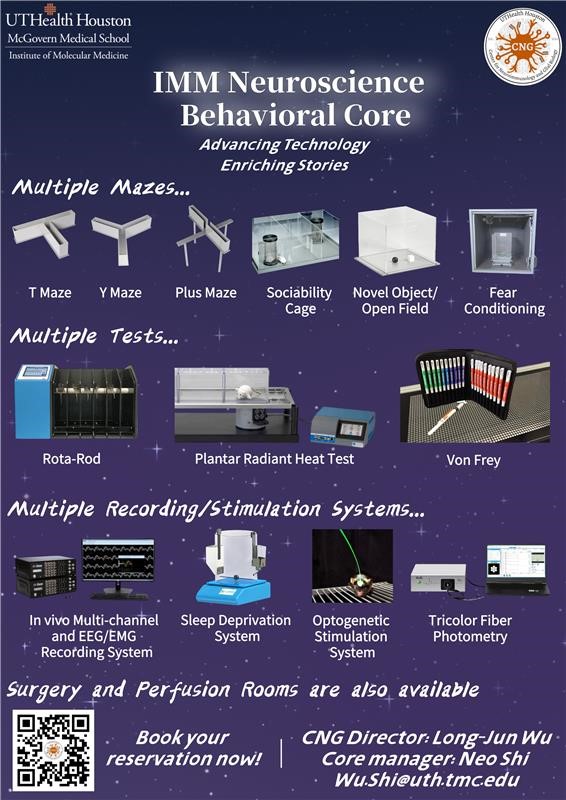 |
| April 15, 2025 | Dr. Yuanzhong Xu, Research Assistant Professor from CNG, has been awarded a R01 Research Project Grant by the NIMH. This is a 5-year award, for a total expected award of $1.95 million in total funding. Using an ethologically relevant mouse model and multidisciplinary, cutting-edge approaches, Dr. Xu’ R01 project will investigate how PVH Prodynorphin neurocircuits mediate real-time flexibility between defensive flight and freezing behaviors, aiming to elucidate the neural underpinnings that encode adaptive defensive responses. Congratulations to Dr. Xu and his team! |
| March 26, 2025 | Mekenzie Peshoff, CNG trainee from Wu lab, has received the 2024-2025 Dee S. and Patricia Osborne Endowed Scholarship in the Neurosciences Research Excellence Post-Candidacy Award from the Graduate School of Biomedical Sciences. This award recognizes outstanding neuroscience graduate students for their exceptional research accomplishments. Congratulations to Mekenzie for this impressive achievement! |
| March 24, 2025 | CNG director Dr. Long-Jun Wu will be hosting the 2nd Hans J. Müller-Eberhard Symposium on Neuroimmunology and Glial Biology on April 25, 2025 at UT Health Houston. The symposium will feature 13 leading scientist speakers, each presenting cutting-edge research, latest findings and emerging advancements in the field of neuroimmunology and glial biology. This event offers a unique opportunity for participants to engage in insightful discussions and connect directly with experts and fellow researchers. Seats for this event are limited, please register early to secure your spot. For more details, please visit our CNG Events page. 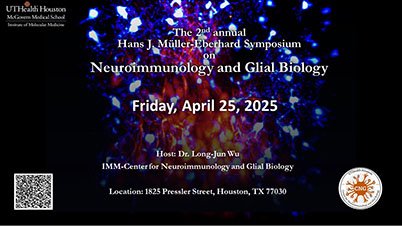 |
| March 21, 2025 | Abhijeet Barath, CNG trainee from the Wu Lab, has matched into the Yale Neurology Residency Program, joining the class of 2029 as one of only three international medical graduates. In addition to outstanding clinical training, the program offers residents opportunities to tailor their experience in basic and translational research, medical education, global health, health equity, and quality improvement. Congratulations to Abhijeet on this remarkable achievement! 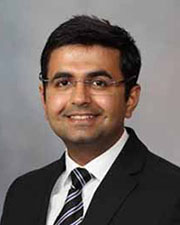 |
| February 28, 2025 | Shunyi Zhao, PhD candidate from Wu lab, in collaboration with Lingxiao Wang, Dimitrios Kleidonas, Fangfang Qi, Yue Liang, Jiaying Zheng and Anthony D Umpierre, has published “Chemogenetic activation of microglial Gi signaling decreases microglial surveillance and impairs neuronal synchronization” in Science Advances. The study shows that activating microglial Gi signaling can regulate neuronal circuit function, offering a potential pharmacological target for neuromodulation through microglia.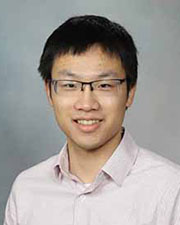 |
| February 15, 2025 | CNG trainees, Yuhan Cao and Cunjin Su from Tong lab, received the Visual Poster Awards for their impressive research presentations on the regulation of metabolism and feeding at the Chinese-American Diabetes Association (CADA) Winter Symposium held at the USDA/ARS Children's Nutrition Research Center, Houston. The symposium provides a platform for communication among members to advance scientific research towards the treatment and prevention of diabetes and related metabolic diseases. 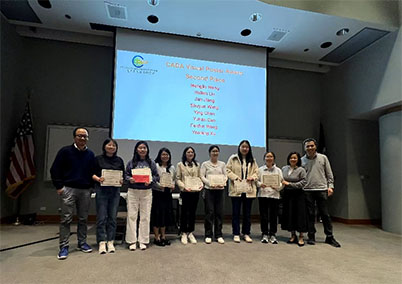 |
| February 11, 2025 | Dr. Long-Jun Wu was featured by the International Brain Research Organization (IBRO) to highlight his research as well as contributions and role as Senior Editor for the Neuroscience journal. Neuroscience is IBRO's flagship journal, publishing original research on the scientific study of the nervous system and playing a crucial role in advancing the organization’s global neuroscience activities. In the interview with IBRO, Dr. Wu shared his vision as the Senior Editor, emphasizing the importance of maintaining high standards of scientific integrity and encouraging inclusion within the neuroscience community. He strives to foster interdisciplinary research that bridges laboratory studies with clinical applications to improve patient care and treatment outcomes. 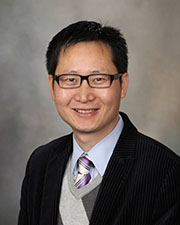 |
| January 3, 2025 | Mekenzie Peshoff, CNG trainee from Wu lab, has received NIH F31 fellowship award. This award recognizes and supports promising doctoral candidates in the scientific-related field to develop into independent research scientists. Congratulations to Mekenzie for this well-deserved achievement! |
| December 20, 2024 | Mekenzie Peshoff, PhD candidate from Wu lab, has been appointed the John J. Kopchick fellow from the Graduate School of Biomedical Sciences at UTHealth Houston. This fellowship is awarded to students who demonstrate exceptional character, leadership in extracurricular activities, research excellence and academic achievement. Congratulations to Mekenzie for receiving this prestigious honor! |
| December 7, 2024 | CNG trainees, Fiona Zheng and Koichi Haruwaka from Wu lab, received the best poster awards for their outstanding research poster presentations at the 30th Annual Neuroscience Poster Session held at the Texas Medical Center, Houston. The awards recognize the dedication and enthusiasm Fiona and Koichi bring to the neuroscience research field. Many congrats, Fiona and Koichi!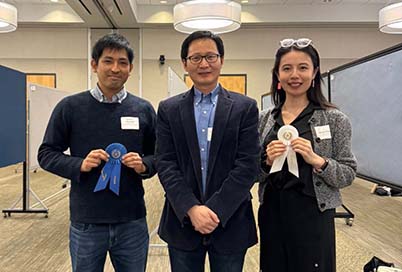 |
| November 8, 2024 | Praveen Pallegar, PhD candidate from Wu lab received the amazing score of top 1 percentile for his NINDS F31 application. This highly competitive fellowship recognizes promising predoctoral individuals who demonstrate the potential to become independent investigators in health-related areas. This award recognizes Praveen’s commitment and potential to make meaningful contributions to the neuroscience community. Many congrats, Praveen! 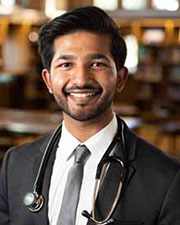 |
| October 29, 2024 | Dr. Long-Jun Wu was invited to give a talk for CNG entitled “Brain Immune Cells: Friend or Foe?” at the 2024 UTHealth Houston IMMpact Symposium “Seeing the Unseen: New Insights into How the Brain Operates.” Dr. Wu presented his laboratory’s main research projects, focusing on the role of microglia in neurodegeneration and microglia regulation in neuronal network. He highlighted the intricate molecular signaling underlying microglia activity and the significance of microglia function in various disease contexts, such as Alzheimer’s disease, seizure, and glioma. The talk concluded with appreciation for the generous support from the Wallace family and Dunn Foundation, which is vital for advancing research in the field of neuroimmunology and glial biology. Attendees also engaged in an interactive question-and-answer session, followed by reception for further dialogue and networking.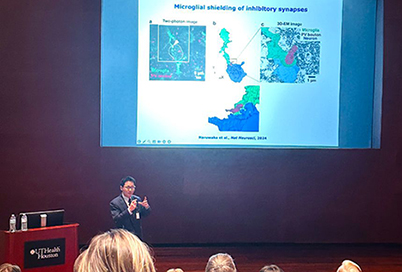 |
| September 16, 2024 | Postdoctoral trainee, Dr. Aastha Dheer, from Dr. Long-Jun Wu’s lab has officially accepted an Assistant Professor position at the Shiv Nadar Institution of Eminence, a multidisciplinary research university committed to excellence in discovery and innovation in India. In addition to this significant career achievement, Dr. Dheer also has been awarded the prestigious Ramalingaswami re-entry fellowship, granted by the Department of Biotechnology in India. |
| September 5, 2024 | Dr. Long-Jun Wu, Director of the CNG, and Dean Dr. Hancock introduced the Center for Neuroimmunology and Glial Biology (CNG) at the IMM Research Retreat. Dr. Wu delivered an insightful talk titled “Center for Neuroimmunology and Glial Biology: Harnessing the Power of Brain Immunity,” in which he outlined the center's mission and innovative approach to understanding brain immune system to develop future neuroimmune therapy. The retreat, held in collaboration with UTHealth Houston’s D. Bradley McWilliams School of Biomedical Informatics, featured a series of special faculty presentations and updates on joint research initiatives. This event provided a valuable platform for sharing progress and fostering collaborations within the research community. 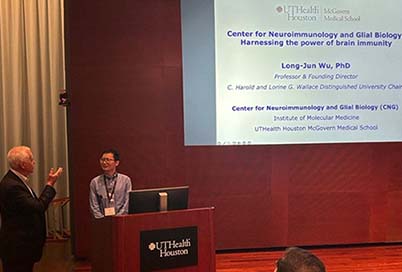 |
| August 30, 2024 | We are pleased to announce that Dr. Qingchun Tong has been awarded the Hans J. Muller-Eberhard, M.D. and Irma Gigli, M.D. Distinguished Chair in Immunology. This endowment recognizes Dr. Tong’s exceptional achievements and provides support for his continued cutting-edge research.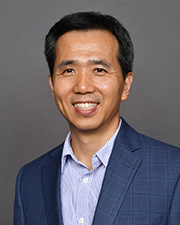 |
| August 21, 2024 | Dr. Long-Jun Wu at the CNG has been awarded R33 grant (4R33AT012544-02) entitled “Identification of botanical hHv1 channel blockers as analgesics for neuropathic pain” as co-principle investigator, together with Drs Steve Goldstein and Ruiming Zhao at UC Irvine, by the National Center for Complementary and Integrative Health. The project addresses the unmet medical need of effective therapeutics for neuropathic pain, a debilitating chronic pain syndrome that affects over 16 million Americans. Researchers seek to optimize a novel fluorescent high-throughput screening assay to identify small molecule blockers of the voltage-gated proton channel (Hv1) from botanicals that reduce inflammatory mediator release by microglia and thereby relieving neuropathic pain. In addition to its potential impact on neuropathic pain, this research holds broader implications for other inflammatory disorders, such as ischemic stroke, as Hv1 contributes to tissue damage after ischemic stroke. |
| May 4, 2024 | Postdoctoral trainee, Dr. Tony Umpierre, from Dr. Long-Jun Wu’s lab at the CNG has officially accepted a tenure-track position as an Assistant Professor in the Department of Neuroscience, University of Minnesota. Dr. Umpierre’s new lab focuses on the role of microglia and their secondary messenger calcium signaling in shaping the neuro-immune landscape during early epilepsy development. The ultimate goal is to uncover key molecular pathways governing early risk of epilepsy development post-injury.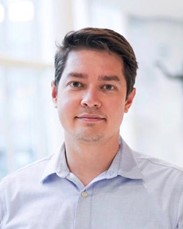 |
| April 26, 2024 | CNG director Dr. Long-Jun Wu hosted the first Inaugural Symposium on the Neuroimmunology and Glial Biology at UT Health Houston, honoring the life and contribution of immunologist Dr. Hans J.Müller-Eberhard, the first director of the Institute of Molecular Medicine. The symposium invited thirteen leading experts in the field, who delivered enriching and stimulating presentations on the latest advancements in neuroimmunology and glial biology. 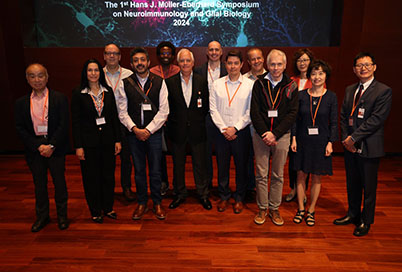 |
| April 12, 2024 | Dr. Long-Jun Wu lab at the CNG has published research article titled “Microglial P2Y6 calcium signaling promotes phagocytosis and shapes neuroimmune responses in epileptogenesis in Neuron. The study reveals following key findings: a UDP1.0 sensor reports enhanced UDP release following hyperexcitability, UDP-P2Y6 signaling transduces microglial calcium activity in epileptogenesis, P2Y6 signaling enhances lysosome biogenesis and inflammatory cytokine production, and preventing P2Y6 signaling preserves neurons and cognition. Congratulations to Dr. Tony Umpierre, the first author, and the entire team for this significant achievement. |
| March 31, 2024 | The CNG is pleased to announce the addition of eight new affiliated faculty members, bringing a wealth of expertise from several key disciplines: From Neurology: • Dr. Jaroslaw Aronowski, Professor • Dr. Juneyoung Lee, Assistant Professor • Dr. John W. Lindsey, Professor • Dr. Fudong Liu, Associate Professor • Dr. Louise McCullough, Professor • Dr. Rodney Ritzel, Assistant Professor From Neurosurgery: Dr. Eunsu Park, Assistant Professor From Anesthesiology, Critical Care, and Pain Medicine: Dr. Wei Cao, Professor This exceptional team will significantly enrich the CNG’s mission in neuroimmunology and glial biology, advancing our research and clinical goals. |
| March 28, 2024 | CNG director Dr. Long-Jun Wu was interviewed by Dr. Mark Mattson for the Brain Ponderings podcast series. The discussion explored the critical roles of microglia in neuroplasticity, chronic pain, brain injury, and disease. Dr. Wu shared valuable insights from his research, highlighting its potential impact on brain health and new therapeutic approaches for neurological disorders. While microglia were once thought to only function as the brain’s immune cells, responding to injury or infection, recent research has shown that microglia play important roles in responding to and regulating neuronal network activity, as well as adaptations of the brain to physiological challenges. These exciting findings, which are generating great interest in the field, were discussed in this thought-provoking and engaging podcast.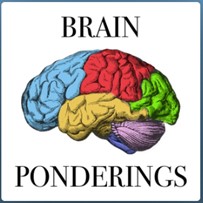 |
| February 7, 2024 | Dr. Qingchun Tong at the CNG has published research article titled “An excitatory projection from the basal forebrain to the ventral tegmental area that underlies anorexia-like phenotypes” in Neuron. The study reveals overactivation of the glutamatergic BF → VTA circuit as a potential cause of anorexia-like phenotypes involving reduced dopamine release. Many congratulations to Dr. Tong and the team! |
| January 5, 2024 | We are excited to announce the official launch of the Center for Neuroimmunology and Glial Biology (CNG) at the Institute of Molecular Medicine, UTHealth Houston McGovern Medical School. As an interdisciplinary research center, CNG’s mission is to unravel the cellular and molecular mechanisms underlying the crosstalk between nervous system and immune system, with the goal of developing neuroimmune therapies for brain disorders. Equipped with state-of-the-art facilities, the CNG brings together talented faculty using cutting-edge techniques to address a wide range of neurological conditions, including neurodegenerative diseases, epilepsy, pain, stroke, traumatic brain injury, and metabolic disorders. The center started with three resident members, each bringing unique expertise: Dr. Long-Jun Wu serves as the Professor and Founding Director at CNG. He holds the C. Harold and Lorine G. Wallace Distinguished University Chair. Dr. Wu leads research on neuroimmune interaction in normal and diseased brain, utilizing advanced genetic models and cutting-edge technologies to uncover therapeutic targets for brain diseases. Dr. Wu is widely recognized for his impactful research, earning him the NINDS Outstanding Investigator Award. He also serves as section editor for many journals and is a dedicated mentor, honored as Teacher of the Year at Mayo Graduate School of Biomedical Sciences. Dr. Qingchun Tong serves as the Professor and Associate Director at the CNG. He holds the Cullen Chair in Molecular Medicine and Hans J. Muller-Eberhard, MD, PhD and Irma Gigli, MD Distinguished Chair in Immunology. Dr. Tong’s research focuses on identifying key targets underlying eating disorders, obesity, and diabetes. His work has been published in many prestigious journals. Dr. Jiaqian Wu, professor and founding member at CNG, combines neuroscience and systems-based approaches to investigate glia cells and neural stem cell differentiation, aiming to identify key regulators as therapeutic targets. Dr. Wu has received distinguished awards and published research in high-impact journals. The CNG is in its nascent stages and is committed to providing opportunities for emerging scientists to advance our understanding of brain health and disease. |